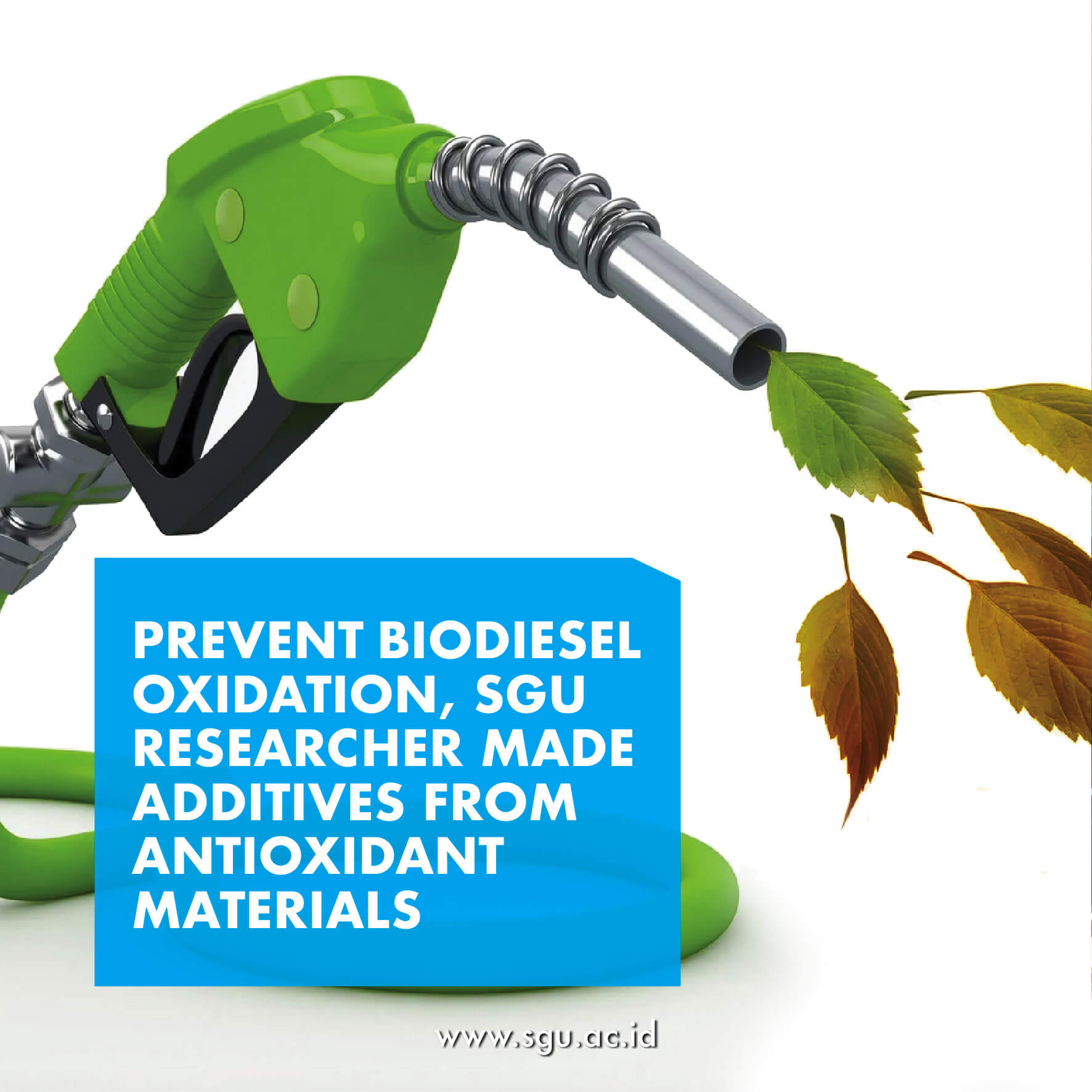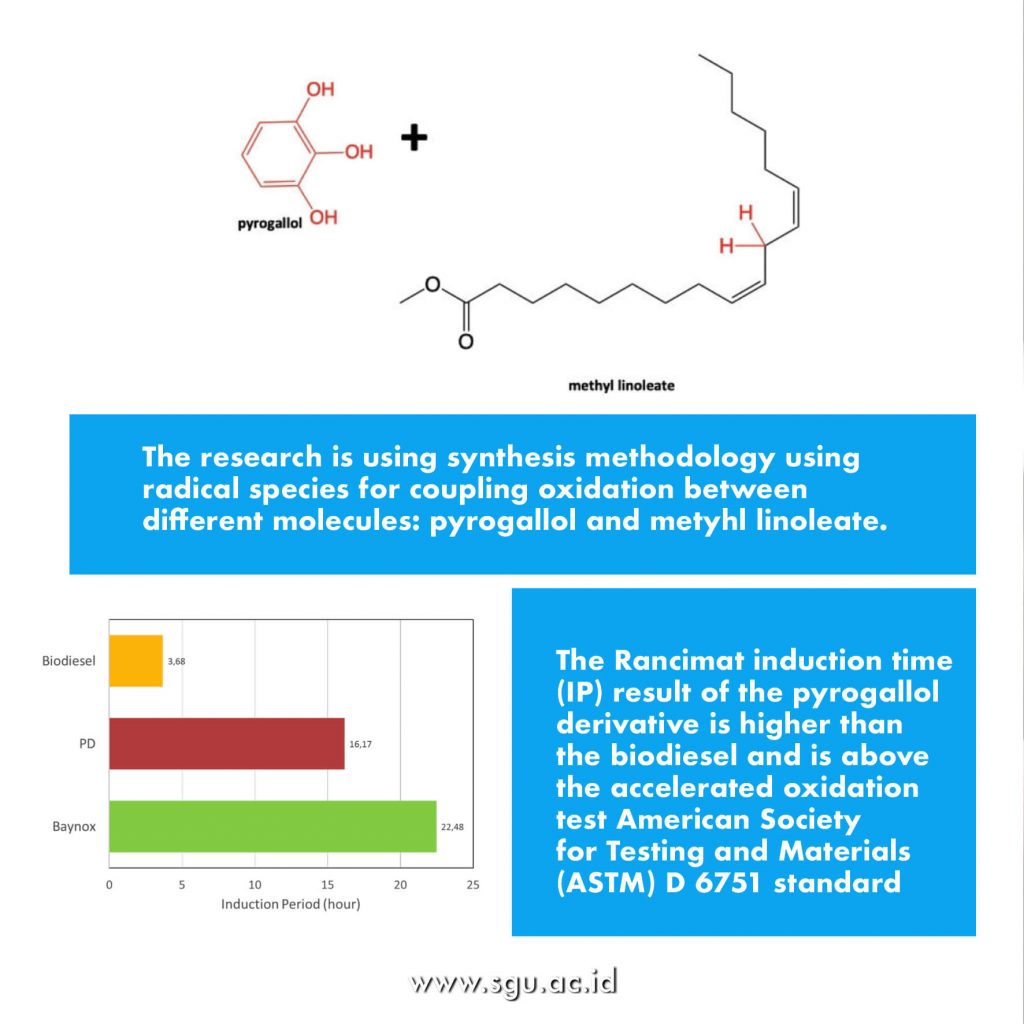
Prevent Biodiesel Oxidation, SGU Researcher Made Additives from Antioxidant Materials
Fossil fuels from coal, oil and gas are limited, it won’t last forever — consume them for long enough and global resources will eventually run out, so when are they due to run out? If we continue to use these fossil fuels at the current rate without finding additional reserves, it is expected that coal and natural gas will last until 2063.
Regarding to that fact, nowadays the energy crisis becomes one of the global issues confronting us becauseenergy is one of the most important resources, many aspects of everyday life rely on fuels. In the transportation sector, private vehicles, buses, trucks, and ships also consume significant amounts of diesel and gasoline.
And so biodiesel came as a problem solver, biodiesel known as renewable energy that is made from renewable resources that are largely plant-based such as palm tree, Nyamplung or Pongamia innata seed. Using Biodiesel as a as a vehicle fuel will improves energy security, increases air quality and the environment, and gives safety benefits. Biodiesel also proves a lot of advantages such as higher cetane number, higher efficiency and low sulfur content.
However, Biodiesel has one major disadvantages. It is prone to oxidation that could lead to the low shelf life and quality degradation. To maintain the quality and the potential of biodiesel as a renewable energy source, oxidation reaction on biodiesels’ molecules must be prevented.
SGU lecturer Dr. Hery Sutanto, M.Si from Department of Chemical Engineering, Faculty of Life Sciences and Technology have an ongoing research project in the oxidation reaction prevention towards biodiesel. This project has been financially supported by The Ministry of Research & Technology of the Republic of Indonesia, Universitas Indonesia, and also internally funded by Swiss German University.
The research is using synthesis methodology using radical species for coupling oxidation between different molecules: pyrogallol and metyhl linoleate. Other experiment also tried to mix the antioxidant with surfactant. The spectrophotometric method was used for solubility test. Antioxidant potential was examined using acid value determination during a four-week storage period as well as the Rancimat test to see its performance under accelerated oxidation conditions.

This research has also been published in the reputable Journals such as Molcules, and International Journal of Renewable Energy Research. It is also published in multiple international scientific conferences. The methodology and the product of this research is currently registered for the patent to the Director-General of Intellectual Property, Ministry of Law and Human Rights, Republic of Indonesia. This research is very useful for fuels industries as Fossil fuel contributes 80% of the world’s energy needs.
Intersted in contributing the world to prevent energy crisis? You can study Sustainable Energy and Environment in Swiss German Univeristy. SGU prepares young generations to face the world’s challenges in terms of sustainability through the Sustainable Energy and Environment study program, under the Chemical Engineering Department. SGU Sustainable Energy and Environment is the first and the only university in Indonesia offering a double degree program. You can get a sarjana degree from Indonesia, as well as a bachelor’s degree from Germany.
Why in SGU
- The first study program in Indonesia that focuses on both the sustainable energy and the environment fields.
- The opportunity to receive a Dual Degree by having a 1 (one) study semester at SGU’s partner university in Germany.
- The opportunity of doing practical work (internship) locally and overseas that will provide you with an extra edge in the job market
Every year SGU Sustainable Energy and Environment sends students to Germany. In semester 5 you will learn about aspects of the Environment at our partner the Ernst-Abbe-Hochschule Jena-University of Applied Sciences campus. Then in semester 6, you will conduct an internship program in Germany for one semester for the field of new renewable energy and the environment.
Here are some lectures that you’ll learn In the Sustainable Energy and Environment program:
- Basic Sciences (Chemistry, Physics, Math)
- Chemical Engineering Principles
- New and Renewable Energy: Solar, Wind, Hydro, Hydrogen, Bio Energy
- Energy Management
- Environmental Science: Waste Treatment, Environment & Process Metrology, Water Purification
Tentang SGU
SWISS GERMAN UNIVERSITY (SGU) is an international university in Indonesia, was established in 2000 as a joint effort between Indonesia, Germany, Switzerland, and Austria. We are the pioneer in offering international curricula in Indonesia. Qualified students can graduate with a Double Degree from Indonesia and Germany, which SGU provides in cooperation with partner universities; surely a valuable tool for your future careers. Ever since its establishment, SGU has been dedicated to delivering quality education in line with international standards and aims to develop skilled professionals who meet the demands of the industry. In order to achieve its objectives, SGU offers quality-oriented learning through 12 Bachelor’s Degree Programs and 4 Master’s Degree Programs ranging from Engineering, Information Technology, and Business to Life Sciences and Social Sciences. Furthermore, with small class sizes, and with English as the medium of instruction, you can look forward to pursuing your tertiary education and degree with full confidence.
Curriculum Back